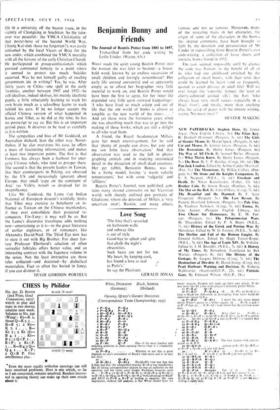The Journal of Beatrix Potter from 1881 to 1897.
Benjamin Bunny and Friends
Transcribed from her code writing by Leslie Linder. (Warne, 63s.)
WHAT made the quiet young Beatrix Potter into the woman she was later to become-a house- hold word, known by an endless succession of small children and lovingly remembered? Her early life seemed uneventful and so apparently empty as to afford her biographer very little material to work on. and Beatrix Potter would have been the first to agree, for her inner life depended very little upon outward happenings:
who have lived so much asleep and out of life that the old world of books is almost as tangible as the new world of the limes. . . And yet those were the formative years when she was absorbing much that was to go into the making of those books, which are still a delight to all who read them.
A friend. the Royal Academician Millais, gave her much encouragement, for he said that 'plenty of people can draw, but you and my son John have observation.' And that observation was used to the full in photo- graphing animals and in studying anatomical detail in the dissection of small dead creatures. Her pet rabbit. Benjamin Bunny, was to be a living model, having 'a warm volatile temperament,' but with some 'vulgarity' and 'silliness.'
Beatrix Potter's Journal, now published, con- tains many shrewd comments on her Victorian world, with sharply outlined pen portraits of Gladstone. whom she detested, of Millais, a 'very uncertain man': Ruskin. and many others,
famous anti not so famous. Moreover, many of the revealing traits in her character, the origin of some of the characters in the books, the shrewd comments, have been brought to light by the devotion and perseverance of !1/411 r Linder in transcribing from Beatrix Potter's on code-writing, a collection of loose sheets and exercise books found in 1952.
The task seemed impossible until by chance the code was broken. to the benefit of all ot us who had our childhood enriched by the collection of small books. with their texts that could be learned by heart (and so frequent!) quoted as catch phrases in adult life). Will we ever forget the 'soporific lettuce; the 'coat of cherry-coloured corded silk'; the bats 'who always have very small voices-especially in a black frost.; and tinally, more than anything else, the scrap of paper with the minute writing, saying No more twist"?
HESTER MAKEIG






























 Previous page
Previous page